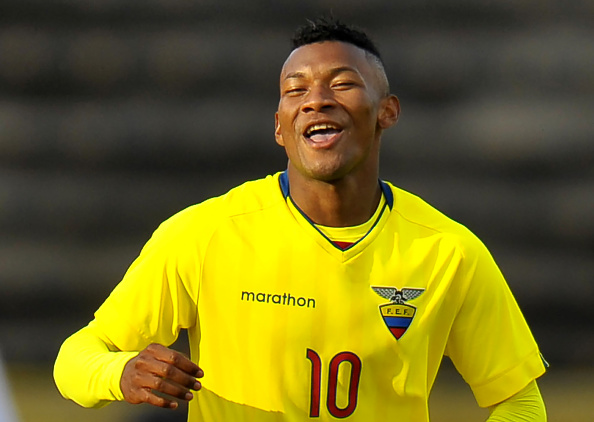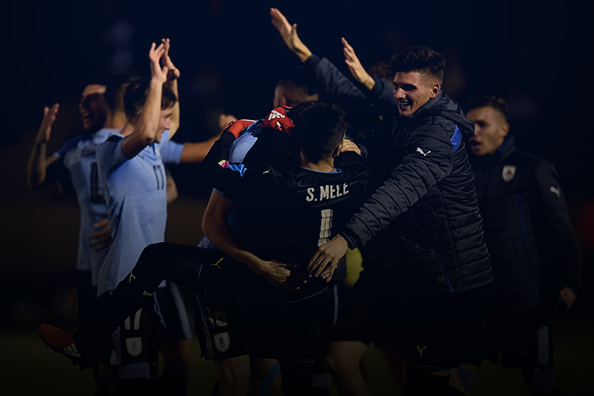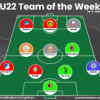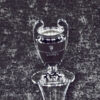Uruguay were crowned champions of the Sudamericano U20 for the first time in 36 years, continuing their excellent record of youth development of late. Tom Robinson has a look at how the tournament played out.
36 years ago Enzo Francescoli waltzed onto the stage and guided Uruguay to the 1981 Sudamericano title. Now the next generation of young Charruas has finally matched those achievements after deservedly being crowned U20 champions of South America following a string of impressive performances in Ecuador.
Spearheaded by a formidable attacking trio of Nicolas Schiappacasse, Rodrigo Amaral, and Nicolas de la Cruz, Uruguay started somewhat slowly but went unbeaten during the initial group round, before asserting their dominance in the hexagonal stage with four victories from five games to lift the trophy in style.
While Uruguayan sides of years gone by have often focused on collective grit and organisation, Fabian Coito’s side were able to marry their usual defensive resoluteness with a slick passing style, organised from deep by Juventus-bound Rodrigo Bentancur and ably assisted by Facundo Waller and Carlos Benavidez.
What’s more, la Celeste were able to count upon good strength in depth, so vital for a tournament comprising of nine games in 25 days, and this spread of talent across the squad ensured they ran out comfortable winners in the end.
Nevertheless, it will be the aforementioned attacking trio who garner the lion’s share of the plaudits. Stocky forward Rodrigo Amaral, with more than a touch of a young Wayne Rooney about him, plundered five goals to make up for the duel disappointment of narrowly missing out on the title two years ago and also fluffing the decisive penalty in their subsequent U20 World Cup exit. Despite his weight issues – he was substituted in every game he started – he remains a potent combination of power, skill and invention and a phenomenally talented individual to follow closely.

Uruguay’s Rodrigo Amaral in action against Venezuela (Photo credit: RODRIGO BUENDIA/AFP/Getty Images)
Atletico Madrid hitman, Schiappacasse may have only bagged three goals but his electric pace and intelligent movement showed why the striker is so highly rated. His clinical finishing ability set him apart from his peers, especially when taking into account the fact he was the sixth youngest player in the entire competition.
Perhaps the most consistent of all the Uruguay players was De La Cruz. The younger brother of international Carlos Sanchez, the attacking midfielder continued his club form with three goals and three assists. His shooting from distance was a particular weapon in his varied artillery and he showed great strength of character to bounce back from a woeful panenka penalty attempt in the opening game against Venezuela.
This triumph was no fluke, but just the latest demonstration of the ongoing excellence of the Uruguayan youth system, made even more impressive given its relative lack of resources and talent pool compared to its two neighbours.
A look back at recent years shows a consistent conveyor belt producing an astonishing raft of prospects. The 2015 crop boasted the talents of Gaston Guruceaga, Mauricio Lemos, Nahitan Nandez and Gaston Pereiro, while the 2013 side featuring Jose Gimenez, Emiliano Velazquez, Diego Rolan and Giorgian de Arrascaeta were U20 World Cup runners up to Paul Pogba’s France side.
With the core of the senior side that has excelled in recent years reaching the end of their cycle, the future certainly looks healthy for Oscar Tabarez’s side to keep on punching above their weight.
Joining Uruguay at the U20 World Cup in South Korea later this year are Ecuador, Venezuela and Argentina, with Colombia and Brazil missing out after disappointing performances in the hexagonal.
Going into the final round of fixtures, hosts Ecuador were the only side capable of knocking Uruguay off the top spot, but a Joaquin Ardaiz brace scuppered any chance of snatching the title at the death. One of the most entertaining sides in the competition, the Mini Tri took advantage of home conditions at altitude and going forward were full of pace and directness, if occasionally left wanting at the back, epitomised by their non-stop 4-3 victory against Colombia.

Ecuador’s player Bryan Cabezas celebrates his goal against Colombia (Photo credit: JUAN CEVALLOS/AFP/Getty Images)
Star performers came in the form of their left-sided combination of attacking full-back Pervis Estupiñan and jet-heeled winger Bryan Cabezas, who finished with five goals and three assists. Part of the Independiente del Valle side that finished as runners up in the Libertadores, Cabezas shrugged off a difficult start to life in Italy with Atalanta with a timely reminder of his considerable skills.
Elsewhere, the Mahrez-esque Joao Rojas started the tournament strongly before fading, central midfielder Jordan Sierra showed why Ajax and Brugge are interested in him, and up front Hernan Lino, Washington Corozo and Jordy Caicedo all made decent contributions.
Third-placed Venezuela were easily the surprise package of the tournament. Qualifying for the hexagonal phase despite drawing all four of their group games and scoring just one goal, the Vinotinto came into their own and added clinical finishing to their watertight defence to make only their second ever U20 World Cup appearance.
In Wuilker Fariñez, Venezuela had the best goalkeeper of the tournament and it’s no surprise why the youngster has already made his debut for the national team, while midfielder general Yangel Herrera was an inspirational presence in the centre of the park and was duly snapped up by Manchester City. Completing their exceptional spine was diminutive playmaker Yeferson Soteldo whose dribbling and incisive passing were a joy to behold.
With besuited national team boss Rafael Dudamel watching from the touchline, he’ll no doubt be delighted to see a number of players who can join the likes of Rondon, Rincon, Martinez and Peñaranda in what could be the makings of a very promising senior side.
The biggest disappointment of the tournament came in the form of Brazil who should have really done better with the players at their disposable. They qualified from the group stage with relative ease without ever getting out of first gear but never kicked on and were made to pay for throwing away leads against Ecuador, Uruguay and crucially Argentina.
Indeed, after the 2-2 draw with Argentina, Brazil still had their destiny in their own hands but could only manage a 0-0 draw against already eliminated Colombia in the final game to go out with a whimper. In what is now the second time in three occasions that Brazil have failed to qualify for the U20 World Cup and is a damning indictment of the state of their youth system.
Nevertheless, a few players emerged with some credit. Centre back Lyanco – formerly a Serbia U19 international – was one of the best defenders at the tournament, burly striker Felipe Vizeu was impressive and scored four goals, while Richarlison was a constant threat going forward too. Caio Henrique and Guilherme Aranda also showed enough to suggest they have a future ahead of them and David Neres’ bursts were enough to see Ajax splash €15mil on the exciting winger.
The fact that Argentina’s qualification came at the expense of eternal rivals Brazil will have made it that bit sweeter but in truth only serves to paper over the sizable cracks in their own failing youth setup.
From Claudio Ubeda’s controversial appointment to the irregular performances throughout the tournament, the sense that this was an underwhelming crop of players was not shifted by their last gasp qualification. Argentina had to rely on their firepower to see them through, first Marcelo Torres in the group stage and then Lautaro Martinez in the hexagonal, both netting five apiece, but were dogged by ill-discipline and a lack of coherent tactics.

Argentina’s Lautaro Martinez celebrates a goal against Venezuel (Photo credit: JUAN CEVALLOS/AFP/Getty Images)
Credit though must be given to the Albiceleste’s fighting spirit which saw them score late goals against Peru, Uruguay, Colombia and Brazil to rescue vital points that ultimately saw them sneak into the final qualification spot for a place in South Korea. What’s more, Martinez was arguably the best centre forward at the tournament and justified why Arsenal and Real Madrid have enquired about him, while Tomas Conechny and Brian Mansilla also impressed.
It was also a disappointing, disjointed campaign for Colombia who finished bottom of the hexagonal group on two points without a win. Juan Camilo Hernandez was the one bright spark for the Cafateros, underlining his burgeoning reputation with two goals and two assists despite being one of the youngest players on show, but ultimately there was only so much he could do alone.
The turning point in their tournament could be traced to the injury to powerful centre forward Damir Ceter, who had two goals in the two opening games, which in turn forced Hernandez to occupy a role further forward where he was not quite as effective and often left isolated. Ever Valencia, Edward Atuesta and Carlos Cuesta were also eye catching in spells, but in the end any hopes of qualification quickly fizzled out.
Elsewhere, Paraguay failed to qualify from a tricky Group A but showed they had some interesting prospects, notably midfield duo Jesus Medina and Cristhian Paredes. Bolivia did better than expected and the likes of Limberg Gutierrez, Moises Villarroel and Bruno Miranda could make the step up to the senior setup.
However, for Chile and Peru there were very disappointing performances with both finishing bottom of their respective groups, despite possessing squads that should have challenged for a place in the Hexagonal. Rather than focus on results, they will hope that the experience proves to be a valuable if harsh one in the development of their budding squads.
Looking forward to the U20 World Cup in South Korea in May, the South American sides will be all hoping to make an impression on the latter stages of the tournament. Uruguay, with the expected addition of Real Madrid midfielder Federico Valverde, will fancy themselves as genuine contenders but Ecuador and Venezuela also have the components to go deep and Argentina should never be written off. With just three months until the competition kicks off, it will be fascinating to see how these precocious prospects deal with this next challenge and see who emerge with their reputations enhanced.
You can find more at @tomrobbo89
- 2020 Argentinian Primera: Young Players To Watch - November 26, 2020
- Scout Report: Agustin Urzi | Banfield And Argentina Winger - October 13, 2020
- 2020 Brasileirao’s 10 Young Players To Watch - September 10, 2020

























































